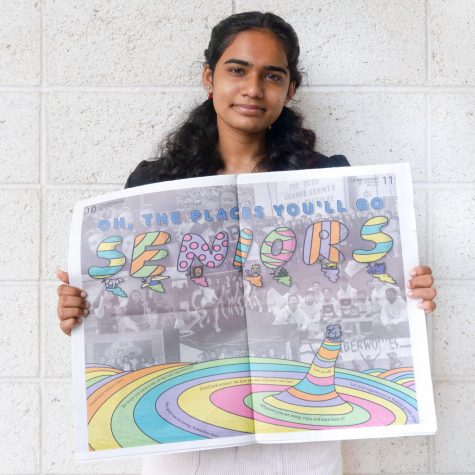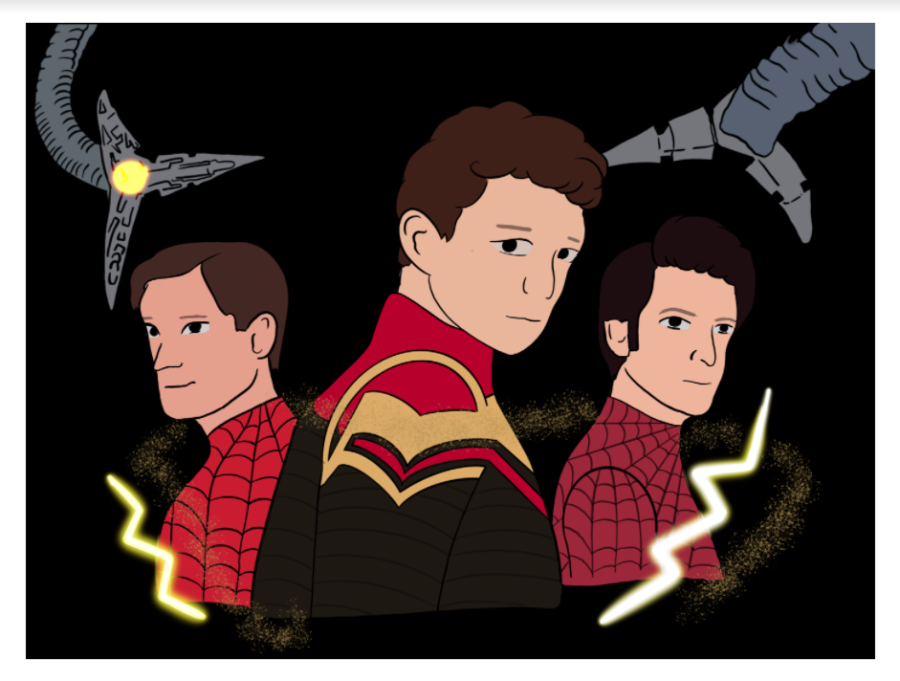‘Spider-Man: No Way Home’ is a Tangled Web of Nostalgia
With the return of many Sony franchise villains such as Green Goblin, Electro and Dr. Otto Octavius, it was difficult to understand the role that many of them played. Only a select few played a major position, while others such as the Lizard were present for the sole purpose of fan service. Condensing the movie to a select villain with a strong motive would be a better decision for the overall plot.

The following review contains spoilers.
“If you expect disappointment, then you can never really be disappointed.”
This motto is repeated throughout the movie by Michelle Jones-Watson (Zendaya); but while relatable to high school students, it does not apply to the movie “Spider-Man: No Way Home.” Preceded by “Spider-Man: Homecoming” and “Spider-Man: Far From Home,” fans expected the best, and Marvel, for the most part, delivered.
Although some may argue that the film crawls dangerously close to lazy fan service, it portrays an intricate web of character development and nostalgia. Displaying both journey and redemptions for two decades of Spider-Man characters, the film also explores the coming of age story of Peter Parker (Tom Holland).
In the previous movie “Spider-Man: Far From Home,” a video shown by the Daily Bugle exposes Parker’s identity, and he is portrayed as a villain who murdered the “hero,” Mysterio (Jake Gyllenhaal). In “Spider-Man: No Way Home,” Parker impulsively decides to solve his problems by magically making everyone forget his identity with the help of Doctor Strange (Benedict Cumberbatch), or should we say “Stephen.”
Portraying Parker’s rash decisions ultimately shows his naivety and youthfulness as a high school student; rather than consulting an MIT admissions officer about the unfair rejection of him and his friends, he resorts to tampering with the multiverse.
He feels an overwhelming guilt for the lives of his loved ones and the need to escape reality, which presents a relatable challenge for all teenagers. Differing from previous Marvel movies such as “Iron Man” or “Captain America: The First Avenger” that highlight the more mature and “adult” aspects of living, the film specifically focuses on the struggles of Parker as a high school senior and adolescent, a unique touch that also makes the film enjoyable for younger audiences.
After Doctor Strange casts a spell that will supposedly solve Parker’s problems, Parker blunders the spell, and characters from different Spider-Man universes enter Parker’s universe. The Spider-Man villains from other Sony franchises such as “The Amazing Spider-Man” return, and we are again and again reminded throughout the movie that they are all “good” souls stuck in an evil being.
But does this argument really diminish the atrocities that the villains committed in their universes? Parker suddenly changes his mind and supports the villains after not much of an interaction, highlighting a major plot inconsistency as it felt rushed and spontaneous, and frankly a futile attempt at emphasizing Parker’s moral compass.
So when Aunt May (Marisa Tomei), a model of Parker’s morality, dies in his hands after his fight with Green Goblin, he is overwhelmed with guilt but also the need to avenge his aunt, an emotion that largely contrasts his innocent, playful character.
In tampering with the multiverse, Andrew Garfield’s and Tobey Maguire’s Peter Parker arrive, a big moment in superhero history by bringing three generations of Spider-Men together.
The closures to each of the Spider-Men, such as Garfield’s Parker saving MJ and Maguire’s Parker saving the Green Goblin, acts that they were unable to do in their own movies, were also corny and unnecessary, only included to appeal to fans rather than to progress the plot.
The finale of the movie when Holland’s Parker decides to let everyone, including his loved ones, forget his existence and send the villains home was poignant and prudently shows Parker’s character and moral development.
Finally, Parker owns up to his actions and sacrifices his needs to protect the people he loves, an act of selflessness that reveals his blooming maturity; as audiences empathize with Parker, witnessing MJ and Ned not recognize him creates an atmosphere of intimacy and emotion.
However, the movie ends with a subtle lightness. Even though Holland’s Parker has lost everything and resides in a worn down studio, seeing Spider-Man swinging through the city of New York in his shiny homemade suit allows fans to experience a warmth of nostalgia—to feel like they are finally home.
Your donation will support the student journalists of Portola High School. Your contribution will allow us to purchase equipment and cover our annual website hosting costs.

Dheeksha Bhima Reddy is the co-Editor-in-Chief for her third and final year on the Portola Pilot. Through her newfound obsession of drinking coffee (cold...

Cara Chan is the Features Editor and Business Manager for her third year on the Portola Pilot. Though she’s feeling bittersweet about her final year,...




